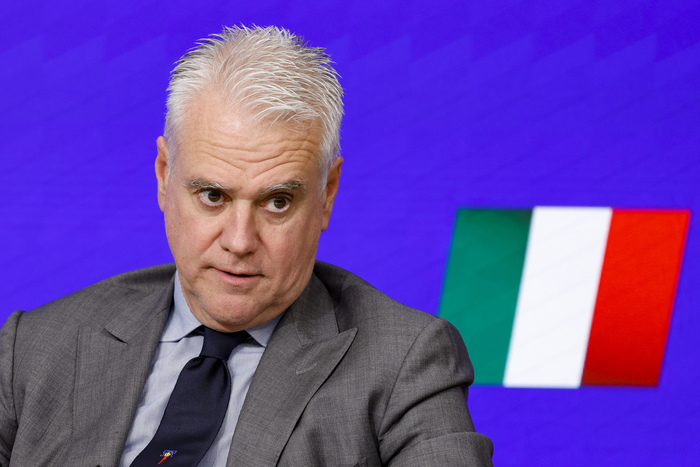The president of the Supreme Court, Carlos Lesmes (on the right) during the opening ceremony of the Judicial Year 2022/2023, on September 8. JJ Guillén (EFE)
The conservative sector of the General Council of the Judiciary (CGPJ) maintains its intention of not negotiating the renewal of the Constitutional Court at the meeting of the ordinary plenary session of the governing body of the judges, convened for this Thursday.
The president of the Supreme Court, Carlos Lesmes, will give an account of the report prepared by the Council's technical office to prepare for his eventual replacement, in the event that he finally resigns.
The conservative group considers that it is an unnecessary opinion and that it does not in any way prejudge how Lesmes's succession should be organized, if he resigns from his position due to the lack of agreements to renew the Council.
That bloc will focus its interventions on these criticisms, and has not the slightest intention of offering any name as a possible candidate to be appointed magistrate of the Constitutional Court, with which there is no
a priori
the least possibility that the negotiations advance and the Judiciary fulfills in this plenary session the legal mandate of appointing two members of the court of guarantees.
The goal of the conservative bloc is to try to get the most out of the visit that the European Commissioner for Justice, Didier Reynders, will begin next Thursday to Spain.
In fact, this group met urgently last Monday to analyze the prospects of the meetings that Reynders will hold, when they did not plan to have contacts again until tomorrow, in order to prepare the plenary session of the Judiciary.
The conservative sector believes that Reynders can make some kind of warning to the authorities about the serious situation of justice, denounced by Lesmes himself in the opening act of the judicial year.
For the conservative bloc, the renewal of the Constitutional is just one more chapter of their demands, among which they include that the substitute for Judge Alfredo Montoya, who resigned last July for health reasons, also be named in the court of guarantees.
The appointment of his successor corresponds to the Senate, which makes the agreement with the PSOE necessary, which will not lend itself to it until the conservatives in turn allow the Council of the Judicial Power to be renewed.
The rebel members also seek that if there were to be an agreement on the renewal of the Council body, it would be its twenty new members who would elect its president, without any indication of the PP and PSOE, parties to which it is up to negotiate the new composition of the body of government of the judges.
The purpose of these members, in short, is to make it difficult, if not prevent, the Government from achieving its objective of renewing the Constitution if, in parallel, concessions such as those described are not made, that is, the appointment in the Senate of a conservative magistrate who replace the resigned Alfredo Montoya, and the guarantee that the new members of the Judiciary will not be conditioned in the election of the president of the Judiciary.
As long as these guarantees are not obtained, it is unlikely that the appointment of the two Constitutional magistrates to be appointed by the Council will take place, unless its president, Carlos Lesmes, manages to break the conservative bloc and attract one of its members.
Lesmes has been making periodic efforts for some time to convince members of the conservative bloc to collaborate in the appointment of the two candidates for the court of guarantees who can obtain a minimum of 12 of the 19 that currently make up the plenary session.
It is not impossible for the president of the Council to achieve his goals, but the conservative group is in fact at open war against him because of the strategy he has followed since the opening ceremony of the judicial year.
In that act, Lesmes announced his willingness to resign if he reaches the conclusion that the lack of progress in the negotiation on the Council of the Judiciary itself means that there will be no agreement in this regard between the Government and the PP, and that the legislature will end without the governing body of the judges having been renewed.
The rebel members consider that this strategy is only aggravating the situation and that the President of the Council has used it to try to force agreements that cannot advance through pressure,
In this sense, the rebel members question not only that the Council's report on the eventual replacement of Lesmes was prepared, if he resigns, but also that this opinion was then taken to the Supreme Court's Governing Chamber so that it could make a statement in tune with the opinion.
The conservative sector considers that said Government Chamber should not act outside the guidelines of the Council itself, whose plenary session has not ruled on this matter.
In this regard, sources from the aforementioned bloc cite article 104.2 of the Organic Law of the Judiciary, which establishes that the government chambers of the courts, and among them that of the Supreme Court, must exercise the functions that they have attributed "with subordination" to the Council. of the Judiciary, which strictly speaking would not have happened in his opinion in this case.
Subscribe to continue reading
read without limits
Keep reading
I'm already a subscriber


/cloudfront-eu-central-1.images.arcpublishing.com/prisa/OTWB63YVDRNKAQLEH7S4FTFBNI.jpg)





/cloudfront-eu-central-1.images.arcpublishing.com/prisa/OADNJHA33STDSSDCLLQNLNFBWQ.jpg)
